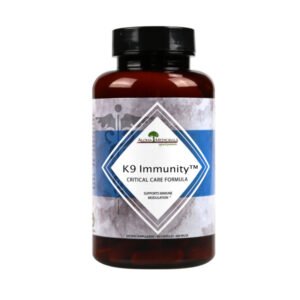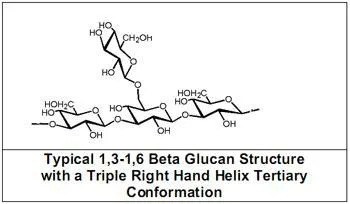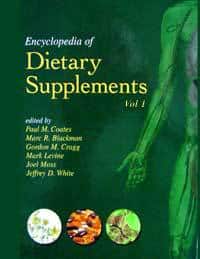
The primary types of heteropolysaccharides found in K9 Immunity™ are different structural arrangements of long chain, high molecular weight, right-hand triple helix structure polysaccharides, primarily with 1-3 beta-linked main chain formation. [typified by Lentinan, PSK and PSP] The main chain compositions are primarily composed of d-glucose and d-mannose, with greater and lesser degrees of alpha and beta linked side chain branching. The side branches contain a number of different five and six carbon sugars such as arabinose, xylose, fucose, fructose, mannose and glucose, with and without attached polypeptides and proteins. These heteropolysaccharides and polysaccharide-protein [glycoprotein] complexes are hot water soluble and ethanol insoluble.
Each ‘0’ capsule contains 500 mg pure heteropolysaccharide extract, with no added binders, fillers, flow enhancers or time release agents.
Understanding Labwork Values (Eng. PDF)
HealingMushroom (Eng. PDF)
by Dr. Georges Halpern, MD, PhD, is scheduled to hit the book shelves around January 1, 2007. This book is available through all the main book outlets, such as Borders and Amazon. Dr. Halpern is one of the world’s leading authorities on Medicinal mushrooms, with more than 100 publications to his credit. Dr. Halpern is currently Professor of Pharmaceutical Science at Hong Kong Polytechnic University, and for many years was Professor of Pharmacology and Immunology at University of California Davis. DogCancer.net products are referenced in this book more than thirty times.
Clinical Pharmacology

Clinical studies and manufacturers observation

There have been few proper, controlled studies conducted on canine cancers using the heteropolysaccharide class of immune modulators. However, there is a wealth of clinical data derived from trials using this class of compound as an adjunct to conventional therapy for treatment of cancer in humans. While this data does not transfer across species lines directly, it is believed by many researchers that most of the mechanisms of action in the development and remission of cancers are identical (or at least substantially similar) between humans and canines. If anything, canines seem to respond better to immunomodulation therapy than do humans.
Encyclopedia of Dietary Supplements: Cordyceps chapter
Encyclopedia of Dietary Supplements: Reishi Chapter
Encyclopedia of Dietary Supplements: Shiitake Chapter
Latest research on Medicinal Mushrooms
Government Published Cancer Reference Book: “Medicinal Mushrooms: Their Therapeutic Properties and Current Medical Usage with Special Emphasis on Cancer Treatments” Here is the full version of a landmark book published by the government of Great Britain in 2001. This is an official publication of Cancer Research UK, the English equivalent of the US National Cancer Institute. Written by professors Dr’s Smith, Rowan and Sullivan of the University of Strathclyde, it is perhaps the most comprehensive text available today for those wishing details on the medicinal mushrooms and their application in cancer treatment.
It is somewhat technical in nature, but very clearly written for ease of understanding by those without an advanced scientific degree. You can download the entire book here in the form of PDF files. Some of the files are quite large, so we have broken it into chapters. Please be patient with the download time, it will be worth the wait. To anyone who claims that this is fringe science we can only point out that England produces some of the best doctors in the world. There is nothing wrong with English medicine, and here is the proof of the value of the medicinal mushroom compounds in cancer treatment, in the form of an official government publication.
This monograph is a comprehensive overview of this subject from the technology of cultivation, extraction and chemistry of medicinal mushroom bioactive compounds to the clinical evidence that suggests an important therapeutic role in cancer, and other major diseases.
Table of Contents (Eng. PDF)
Preamble (Eng. PDF)
1. Introduction (Eng. PDF)
2. The Nature of Fungi with Special Emphasis on Mushrooms (Eng. PDF)
3.a Medicinally Important Mushrooms Part 1 (Eng. PDF)
3.b Medicinally Important Mushrooms Part 2 (Eng. PDF)
3.c Medicinally Important Mushrooms Part 3 (Eng. PDF)
4. Technology of Mushroom Cultivation (Eng. PDF)
5. Extraction, Development and Chemistry of Anti-Cancer Compounds from Medicinal Mushrooms (Eng. PDF)
6. Immunomodulatory Activities of Mushroom Glucans and Polysaccharide-Protein Complexes in Animals and Humans (Eng. PDF)
7. The Role of Polysaccharides Derived from Medicinal Mushrooms in Cancer (Eng. PDF)
8. Additional Medicinal Properties (Eng. PDF)
9. Regulatory and Safety Criteria (Eng. PDF)
10. Conclusions (Eng. PDF)
Appendix-1. Overview of Human Immune System (Eng. PDF)
Appendix-2. Standard Antitumor Activity Test (Eng. PDF)
Appendix-3. Medicinal Mushrooms and Cancer Prevention (Eng. PDF)
Author Biographies (Eng. PDF)
Executive Summary (Eng. PDF)
Acknowledgment (Eng. PDF)
Human Leukemia: Here is an article published in Life Science showing the mechanism of action in Human Leukemia for some of the anticancer properties of Cordyceps sinensis:
Induction of HL-60 apoptosis by ethyl acetate extract of Cordyceps sinensis fungal mycelium
Reducing the side effects in Radiation Treatment: The latest article from Radiation Research Society Journal:
Protection against Radiation-Induced Bone Marrow and Intestinal Injuries
Anti-Cancer Properties: A peer-reviewed article by Dr. Solomon Wasser of University of Haifa, Israel:
Medicinal mushrooms as a source of antitumor and immunomodulating polysaccharides
Medicinal Properties of Mushrooms, including anticancer: Another peer-reviewed article by Dr. Solomon Wasser of University of Haifa, Israel:
Medicinal Properties of Substances
On The Trail of the Yak – Most complete article yet on Cordyceps
New Study Demonstrates the Effects of Immune Modulation Therapy on Dogs with Cancer
Indications
K9 Immunity™ is indicated as a daily supplement for use in adult dogs to help offset the side effects of chemotherapy and radiation therapy, and for the avoidance of opportunistic infections associated with conventional cancer treatments. K-9 Immunity™ is used primarily as an adjunct to conventional chemo- and radiation therapy in canine patients undergoing treatment for cancer. This supplement can be used on a daily basis for long periods of time in otherwise healthy adult canine cancer patients, which can result in an overall lower incidence of treatment side effects and enhancement of quality of life parameters, through its well-proven immunomodulating effect.
CONTRAINDICATIONS
K9 Immunity™ has no known contraindications in canines.
PRECAUTIONS
The use of K9 Immunity™ has been shown to lower abnormally high blood sugar levels and appears to increase the efficacy of insulin and oral anti-diabetic drugs. Care should be used in diabetic canines, and the dosage of insulin or oral anti-diabetic drugs may need to be adjusted accordingly.
USE IN PREGNANCY AND LACTATION
Safety and efficacy has not been evaluated in pregnancy or lactation or in puppies under 1 yr. age. Caution and careful observation should be used in these cases.
FOOD AND DRUG INTERACTIONS
There are no known drug interactions besides those associated with increased insulin sensitivity in diabetic patients as noted above.
WARNINGS
K9 Immunity™ is primarily used as a daily supplement in seriously ill canine patients; the caregivers should be counseled that immuno-modulation therapy alone may not be the best choice for treating their dog’s condition. Likewise, the attending veterinarian should realize that this supplement is intended to augment and enhance other therapeutic strategies, and K9 Immunity™ is not intended as a stand alone therapy, except in those cases where there are no other appropriate treatment options available.
ADVERSE REACTIONS
There have been no adverse reactions noted with K9 Immunity™. An allergic reaction is always possible with this and all other biologically active agents. If an allergic reaction is suspected, stop the supplement immediately.
OVERDOSAGE
There have been no known incidences of overdosage of K9 Immunity™ . The acute and chronic safety of this supplement has been tested at dosages up to 1000 times the daily recommended dosage and no incidence of toxicity has been noted. K9 Immunity™ is well tolerated and non-toxic.
DOSAGE AND ADMINISTRATION
During active cancer therapy and 7 days pre/post surgically, 500 mg of K9 Immunity™ per 10 lbs body weight per day, taken with meals is recommended. (one capsule per ten pounds per day)
As an adjunct to antibiotic therapy, 500 mg per 20 lbs body weight per day is indicated for the duration of the therapy plus an additional 1 week after antibiotic therapy has stopped.
For general immune support and avoidance of cancer recurrence after the patient is clear of all dog cancer signs, 500 mg per 20 lbs body weight per day of K9 Immunity™ with meals is recommended.
A Transfer Factor product such as bovine colostrum or avian source Transfer Factor is recommended co-administered as an adjunct with the K9 Immunity™, as this enhances the bioavalability [and thereby the effectiveness] of the heteropolysaccharide immune modulator compounds. The daily dosage may be administered once daily or divided into multiple doses with equal effectiveness.
HOW SUPPLIED
K9 Immunity™ comes in bottles of 84, red and white colored capsules of 500 mg each.
Understanding Labwork Values
The following section on normal lab values is for information only. It is not to replace the advice of your veterinarian. You should not use this information in trying to make a diagnosis yourself. Your pet’s life is too important to make your own diagnosis! One of the first steps in determining the state of health for a dog is to do a complete blood workup. This involves taking a blood sample and sending it to a lab for testing of various chemical levels, and making a count of the different types of cells present. While bloodwork alone can rarely be used in making a diagnosis, it is an important clue for the vet. Below is an alphabetical listing and definition of normal veterinary ranges in both blood chemistry and blood cell counts. Keep in mind that normal ranges may vary slightly between different laboratories. Also included here is information pertaining to normal body temperature for dogs.
Alkaline Phosphatase (ALKP): 23 – 212 U/L (units per liter) Definition: An enzyme predominantly produced in the liver and bone. Levels are elevated in liver disease. This is also the most important marker in assessing bone cancer. A high ALKP level in a bone cancer patient usually indicates a rapidly progressing disease. On the other hand if the ALKP level is dropping, that usually indicates the treatment is working and the bone cancer is receding.
Alanine transaminase (ALT): 10 – 100 U/L Definition: An enzyme found in the blood which can be found in many tissues of the body but more highly concentrated in the liver.High levels can be an indicator of liver disease.
Albumin (ALB): 2.70 – 3.80 g/dl Definition: Synthesized in the liver, Albumin contains the highest concentration of protein in plasma. It’s prime function is to keep fluid from leaking into the tissues and is also a good indicator of kidney and liver disease.
Amylase (AMYL): 500 – 1500 U/L Definition: An enzyme released in the pancreas. Useful in diagnosing pancreatic disorders.
Bilirubin (TBIL): 0.00 – 0.90 mg/dl Definition: Bilirubin is the product that results from the breakdown of hemoglobin in the red blood cells. Abnormal bilirubin can be a sign of liver problems.
Calcium (Ca): 7.90 – 12.00 mg/dl (milligrams per deciliter) Definition: Tests calcium levels in the blood to detect any disorders in the bones or kidneys.
Cloride (Cl): 109.0 – 122.0 mmol/1 Definition: Linked with Sodium, changes in this level often accompany the changes in the sodium level.
Cholesterol (CHOL): 110.0 – 320.0 mg/dl Definition: A steroid made in the liver, it’s function is to form cell membranes that are utilized in all parts of the body.
Creatinine (CREA): 0.50 – 1.80 mg/dl Definition: Part of muscle make up, creatinine levels can determine kidney function.
Globulin (GLOB): 2.50 – 4.50 g/dl Definition: A measurement of this protein in the blood.
Glucose (GLU): 77.0 – 125.0 mg/dl Definition: The source of energy for red blood cells, brain and most parts of the body.
Granulocytes (GRANS): 3.3 – 12.0 Definition: Produced in the bone marrow, they comprise 70% of all white blood cells as they include neutrophils, eosinophils and basophils.
Hematocrit (HCT) normal range: 37 – 55% Definition: The hematocrit is the percent of whole blood that is made up of red blood cells. The hematocrit is the compound measure of Red Blood count number and size.
Hemoglobin (HGB) normal range: 12.0 – 18.0 g/dl (grams per deciliter) Definition: Hemoglobin is the oxygen carrying protein in the red blood cells.
Lipase (LIPA): 200 – 1800 U/L Definition: Secreted by the pancreas, lipase values can be an indicator of the function of the pancreas.
Lymphocytes/Monocytes (L/M): 1.1-6.3 Definition: Lymphocytes are produced in the lymph nodes through the body and are responsible for the activity of the immune system by producing antibodies. Monocytes make up about 5% of the white cell count and act as scavengers for the removal of debris from dead tissue and areas of inflammation.
Mean Corpuscular Hemoglobin Concentration (MCHC): 30.0 – 36.9 g/dl Definition: Hemoglobin concentration per red blood cell.
Phosphate (PHOS): 2.50 – 6.80 mg/dl Definition: An indicator on how the body uses calcium and can be an indicator of kidney problems.
Platelets (PLT): 175 – 500 Definition: Also called a Thrombocyte their function is to halt bleeding (form blood clots).
Potassium (K): 3.50 – 5.80 mmol/l Definition: Found in cells, it’s main responsibility is to carry different products into and out of the cells.
Reticuloctyes (Retics): 0 – 0.2% Definition: These are immature red blood cells.
Sodium (Na): 144.0 – 160.0 mmol/1 Definition: Measures the amount of sodium in the body and is a indicator of dehydration.
Total Protein (TP): 5.20 – 8.20 g/dl Definition: Consisting of Albumin and Globulin, this result can also be an indicator of liver and kidney disease as well as malnutrition and other conditions.
White Blood Count (WBC): 6.0 – 16.9 Definition: Measures the white blood cells. White blood cells are the major infection fighting cells in the blood. WBC is the most important figure in assessing the condition of a lymphoma patient. A high WBC is an indicator of advanced disease, while a WBC returning to normal (or at least moving towards normal) is an indicator that the treatment is helping. Be aware that steroids such as Prednisone will artificially lower the WBC, so if steroids are being used, the WBC has far less meaning in terms of assessing progress in the patient.
Normal Body Temperature
The normal body temperature of your dog should range from 101 to 102.5 F. The best way to determine body temperature is rectally. You may also obtain axillary (between the front leg and the body – e.g.: armpit) body temperature readings, but this method is not recommended when an accurate reading is required. You may use a glass mercury or a digital thermometer. A digital thermometer may be more easily read, it’s safer, and they are relatively inexpensive to purchase. If the body temperature has exceeded 103 F, contact your vet immediately. This is especially important if your dog is receiving chemotherapy as some chemo drugs can lower immunity and leave them susceptible to infection.
METHOD OF TAKING TEMPERATURE
When using either a glass or digital thermometer, lubricate the thermometer with a good water-soluble lubricant such as KY. Slowly and gently insert the thermometer into the rectum about 1-2 inches. When using glass, hold in place for 2 minutes; a digital will signal when the reading is complete.
K9 Immunity™ is a serious supplement that your vet should consider adding to the course of therapy he or she is recommending for treatment of your dog’s cancer. It contains the most widely used anticancer compounds in the world: PSK, PSP and Lentinan, as well as nearly 200 other closely related heteropolysaccharide immunomodulator compounds. It is available in the USA and most other countries without a prescription. K9 Immunity™ is a daily supplement derived from all natural, all 100% certified organic sources. And it is made in America to the highest pharmaceutical standards. If you are outside the USA, email our order desk for full details on any shipping or permit requirments for your country. We currently ship to over 30 countries, so chances are we can get this to you.